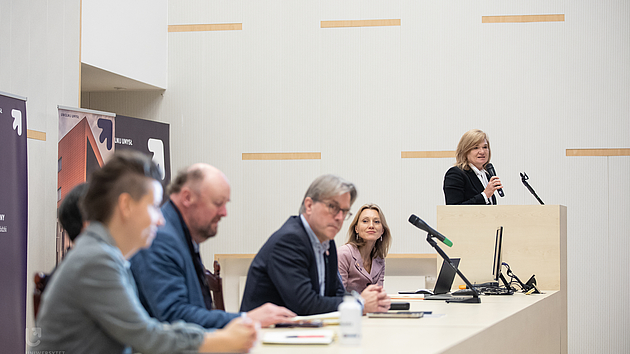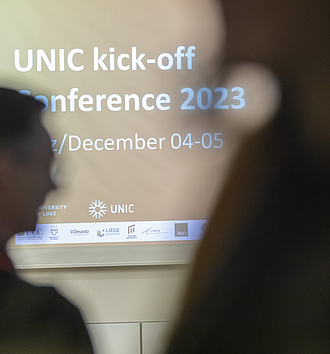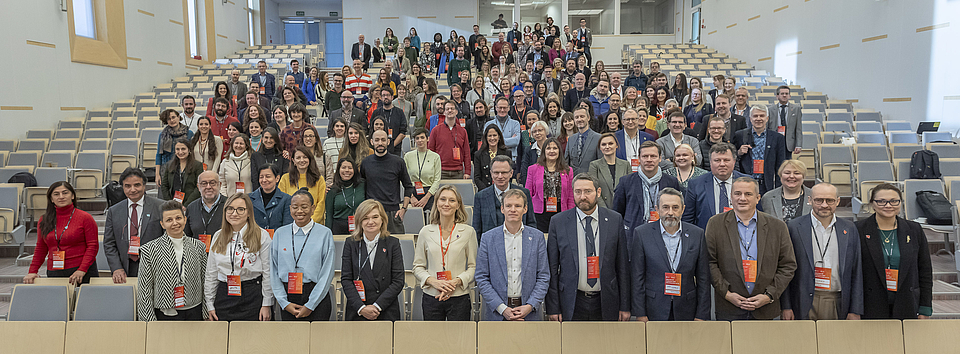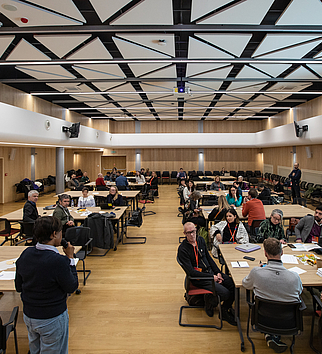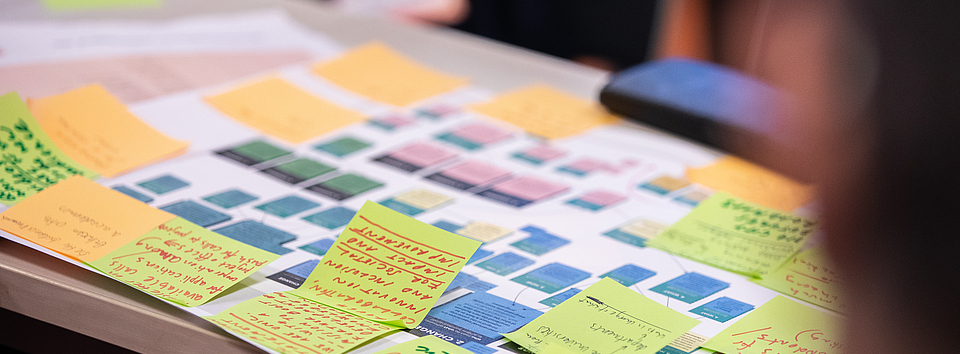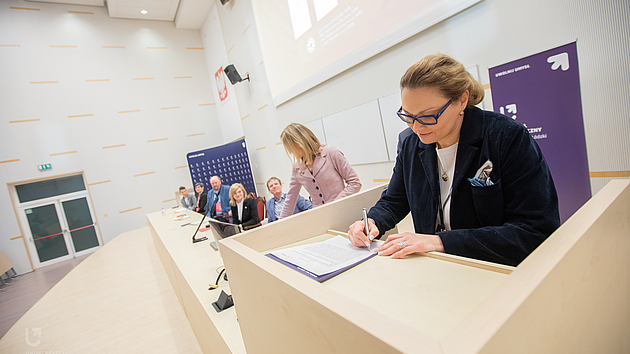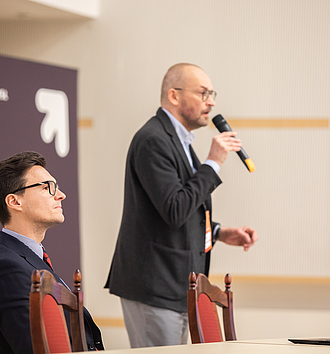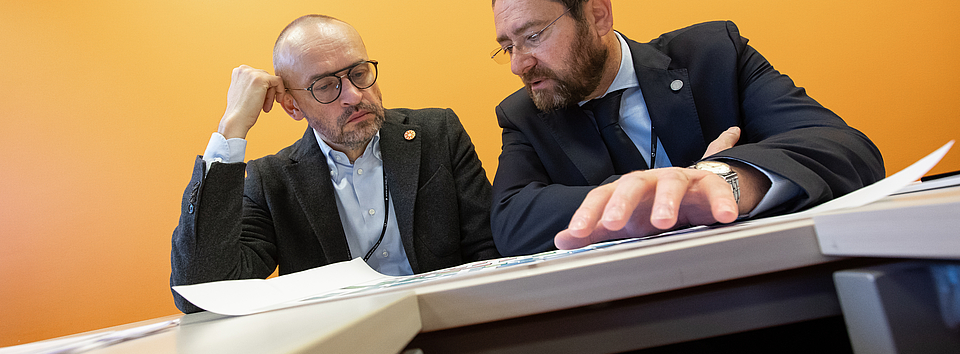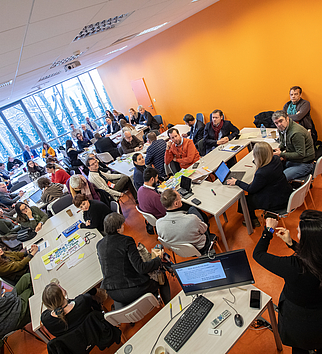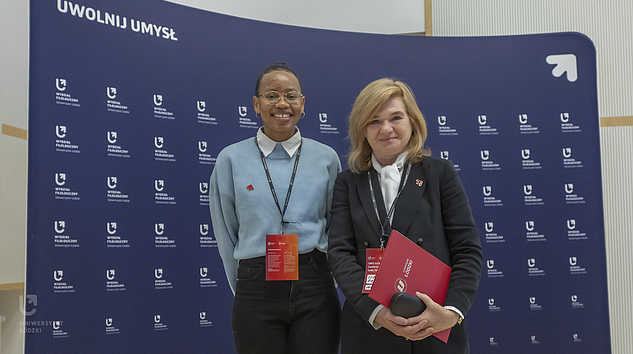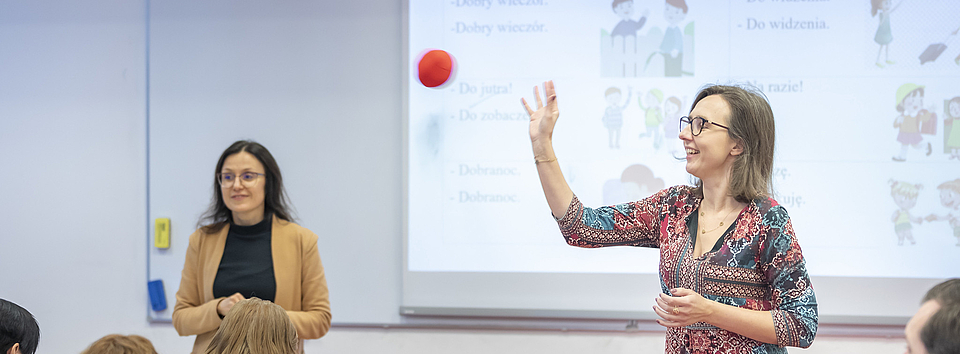UNIC 2.0: the exchange of thoughts and ideas – new opportunities, common goals
Photo report of the conference
"Towards a Joint Vision 2040" is the kick-off conference of the second phase of the UNIC (European University of Cities in Post-Industrial Transition) Alliance collaboration. The closing session of the conference at the Faculty of Philology of the University of Lodz, was attended by Prof. Elżbieta Żądzińska, Rector of the University of Lodz, Prof. Łukasz Bogucki, the university of Lodz Vice-Rector for International relations, Prof. Ed Brinksma, Rector of Erasmus University Rotterdam, Prof. Dr. Peter Scholten and Dr. Daria Ratsiborinskaya from Erasmus University Rotterdam (who are managing the project).
This was an extraordinary experience that will enable us to jointly shape the future of our European University of Cities in Post-Industrial Transition The presence of the University of Lodz researchers at this conference and their great interest in cooperation within the UNIC Alliance prove the strength of our academic community. This was not just a meeting of representatives of different universities, but a real exchange of ideas and thoughts that drive our scientific mission
– Professor Elżbieta Żądzińska, Rector of the University of Lodz summarised the meeting.
In her speech, Rector of the University of Lodz also emphasised the importance of relations with the authorities of the cities in which the universities belonging to the Alliance are located:
We are determined to strengthen these ties, as together we can create an environment that serves both the academy and the local community.
Representatives of the Taras Shevchenko National University of Kyiv, i.e. Volodymyr Bugrov, Rector, and Ksenia Smyrnova, Vice-Rector for Education were special guests at the conference. In accordance with the UNIC's application, the Taras Shevchenko University has become an associate partner of UNIC and a Letter of Confirmation of the university's affiliation to the UNIC community was signed during the conference. Ksenia Smyrnova expressed her hope for an even stronger strengthening of cooperation with UNIC, with European Universities:
We are very grateful to be here today, especially at this terrible time for Ukraine, a time of invasion by Russia, which we have been experiencing for almost two years now. Our university has not stopped even for a day, and we are getting stronger together with our partners. We are grateful for the long-standing cooperation and effective bilateral partnership with the University of Lodz as well as other universities. I hope that our membership in the Alliance will be beneficial to each of us and that we will all feel stronger thanks to being together.
Sustainability, arts, health, superdiversity – a shared vision and future of UNIC
This was the first official meeting of all the representatives of the ten universities from across Europe that make up the Alliance opening which opened its new phase.
The conference brought together university leaders, coordinators of work packages and people involved in them, people representing priority thematic lines at UNIC, as well as UNIC Student Ambassadors. Professionals from various areas carrying out ambitious partnership activities within numerous projects, who support academic staff with knowledge and experience, namely: experts in projects, mobility, international cooperation, superdiversity, sustainability, social inclusion, also had the opportunity to meet.
Prof. Dr Peter Scholten, UNIC Alliance Coordinator, encouraged to reflect on key issues, stressing that strength lies in unity:
We invite you to dream boldly, not because it's mandated by Brussels, but because you envision a future where education and research thrive, yielding more substantial impact. Professor Elżbieta Żądzińska emphasized thinking outside the box, urging us to try new approaches and boldly venture into uncharted territories. You are the invaluable resources that can make our shared aspirations a reality. Eradicating the traditional boundaries between students and staff, universities and cities, and professionals and students is crucial. It's not about doing things for students or cities; it's about doing things with them. We extend this call to our audience, including students, researchers, policymakers, services, cities and NGOs.
He added:
Reflecting on the significance of European values is imperative, especially in current times, when we're less than 500 kilometres away from conflict. This conference urges us to bridge the gap between research and education. It's not solely about discussions but also about the new thematic lines and faculties established within UNIC. We emphasize key themes such as sustainability, health, superdiversity, resilience, art, entrepreneurial learning, and institutions and justice. This gathering serves as an opportunity for everyone to connect and express what they need. Everything conceived during this conference will be curated on the leadership board, culminating in a joint vision. This marks an exceptional chance for each of you to contribute to defining the future of UNIC.
Based on the conclusions developed and gathered during the sessions and thematic lines, a vision for UNIC will have been developed by the end of December this year in order to start work on the UNIC 2040 strategy in 2024.
The Alliance's plans for the coming years include developing various forms of innovative education, supporting academic teachers in developing teaching tools and skills, mobility – also virtual mobility, and creating common educational formats, such as double-diploma programmes or micro-credentials (confirmation of academic results achieved within the framework of a short educational experience, e.g. course or training). The next stage of the Alliance's operation is to further support the development of knowledge through cooperation, innovation and integration for social impact.
Further activities also include the design and implementation of the Hybrid Campus; the development of partner matchmaking processes at UNIC and local levels, based on the needs of the city; the mapping of services for inclusive mobility; UNIC – a globalisation strategy; linking UNIC with universities and cities outside the EU.
Sessions and workshops – leaders of the international universities of the future at the University of Lodz
The conference consisted of thematic lines that were introduced to strengthen UNIC's work in terms of education, commitment and inclusion across the ten universities. Each thematic line was focused on a specific topic related to post-industrial transition and brought together educators and researchers working on this topic at the faculties of all partner universities.
Parallel sessions were focused on the thematic lines: Superdiversity, Sustainability and Green Cities, Urban Resilience, Justice, Security and Institutions, Entrepreneurial Learning for Innovation, Health and Wellbeing, Arts, Culture and Creativity. Virtual campus: for whom and how to use it? Global engagement. Subsequently, during the plenary poster session, participants from all thematic line sessions presented their action plans. The meeting provided a unique opportunity to share experiences, involve others (education specialists, ICT services, international offices, city representatives) so as to link action plans with relevant experts.
Participants in the individual panels and sessions emphasised the great commitment, wide range of topics and intensity of the meetings. Most sessions took place at the Faculty of Philology and some of them at the University of Lodz Library, the University of Lodz Conference and Training Centre and the Faculty of Management.
Dr Izabela Florczak from the Faculty of Law and Administration of the University of Lodz was the co-presenter during the "Justice, Security and Institutions" panel:
With activities centred around the theme of Justice, Security and Institutions, we will work on developing a model that would allow to combine different issues (such as migrants' rights, cyber security, domestic violence) into interconnected components. The first one will involve preparing course and summer school programmes, during which students will expand their theoretical knowledge. They will be able to use this knowledge in their law clinics (units that support local communities with legal advice). The competences gained through courses/schools and clinical activities will be used during activities involving decision-makers at a city level. The creation of a platform for collaboration between law clinics from partner universities, in order to share experiences, good practices and enhance skills (both of the students and the academic staff supporting their activities) will also be a valuable activity.
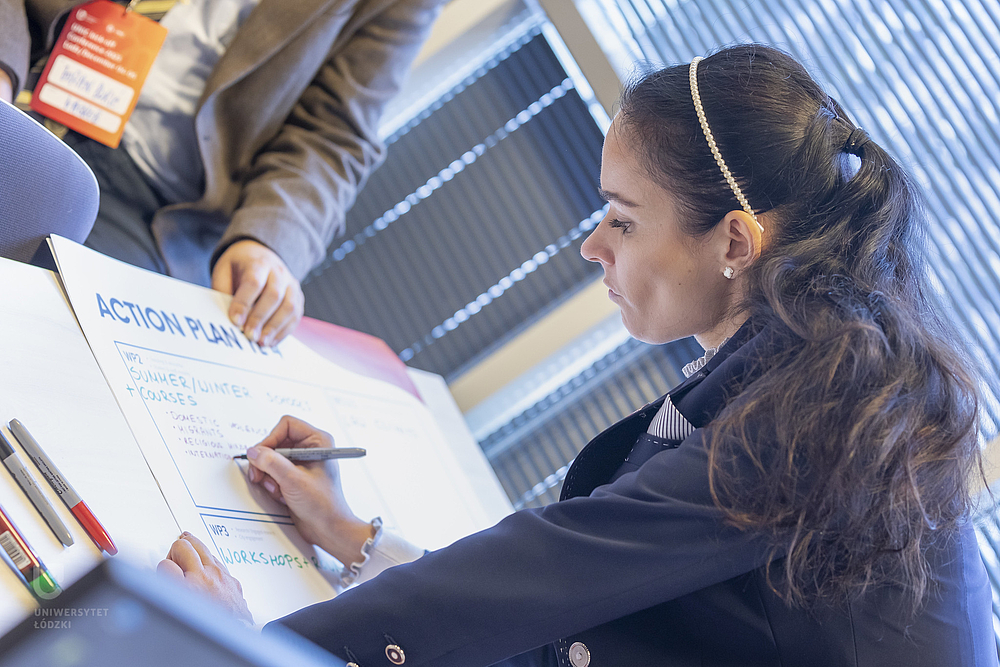 (Dr Izabela Florczak)
(Dr Izabela Florczak)
In an expert session at the University of Lodz Library, the participants had the opportunity to meet and discuss in person their ideas for working together on selected topics, exchange experiences about their involvement in UNIC and generate some ideas for future cooperation. Anna Rolczak, Head of the Communications and PR Centre, participated in the panel:
These were intense days. During an expert session and a workshop on communication, we talked primarily about how to improve the Alliance in this area and make sure that our students, doctoral students and staff benefit from its full potential. Of course, it is difficult to discuss in such a short time everything that so far we have only been able to talk about online. This shows how important such meetings are, how much they help in the daily work and how many great people make up the UNIC Alliance!
UNIC is also about the student voice and this conference proved the importance of involving young and ambitious people. We met the UNIC Ambassadors, who were selected from numerous applications before the conference – Rumbidzai Hodzonge and Julita Maciejewska, students at the University of Lodz.
During the panel on students who are UNIC Ambassadors, we discussed the aims and methods of those in these roles. We exchanged ideas on what we think they can contribute and how they can contribute for the good of the UNIC community. We split into groups and worked on creating a profile of the persona we thought would work best in this role. We looked at what they should be like, what skills they should have and what they might need in order to get motivated to be involved. It was undoubtedly fantastic to be able to meet such a diverse group of students in person and have a look at the same issues from the perspective of the ten UNIC member universities
– said Julita.
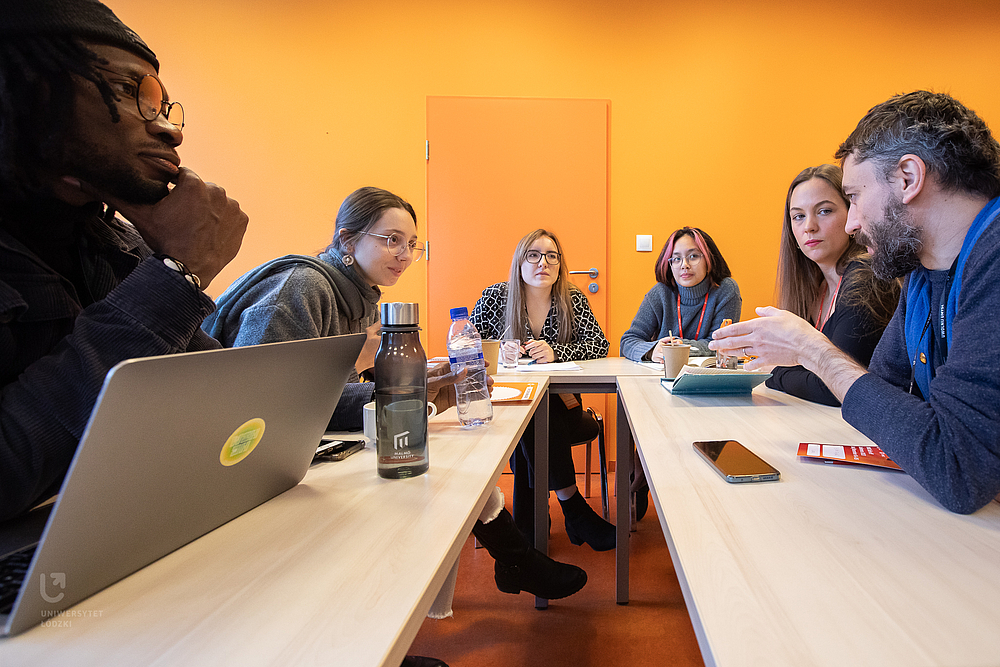
In turn, during the open lecture for the University of Lodz community – 'UNIC@Lodz', the very idea of European Universities, the first phase of the project and the beginning of UNIC 2.0 were talked about. Information about UNIC's partners, the activities that have already been carried out and those yet to be implemented by the Alliance constituted an important element. The lecture was delivered by Prof. Łukasz Bogucki, the University of Lodz Vice-Rector for International Relations and Dr Maciej Jażdżewski, Head of the International Hub, was very popular.
The UNIC's renewed goals extend to 2040, but already now:
- thanks to the University of Lodz's membership in the UNIC Alliance, every member of our academic community (student, doctoral student, academic teacher or member of the administrative staff) can learn one of the 10 UNIC Alliance languages free of charge at their own convenience
- as part of virtual mobility, students of the University of Lodz can participate in virtual classes offered by other universities associated in the Alliance
- researchers can participate in training organised by the Alliance and seek partners for international research projects.
University of Lodz in the UNIC Alliance – the second phase of the partners’ cooperation and the new name of the Alliance
The UNIC Alliance was launched in 2020 as a partnership of eight universities. The University of Lodz has also been a part of it for the past two years and it has been an official partner of the Alliance since October 2023. The second phase of cooperation between the partners, who set long-term goals in terms of joint implementation of educational initiatives, promoting Engaged Research, cooperation with the city and its inhabitants, and deepening the integration of partner universities at all levels is just beginning has just begun.
The next phase of the cooperation also includes the new name of the Alliance: The European University of Cities in Post-Industrial Transitions, reflecting the close connection of the planned activities with the environment in which the universities operate. Each of them is located in a city or region that has undergone post-industrial transformation and is struggling with its consequences while building a new identity.
The UNIC Alliance wants to be a part of the changes that occur in the communities of these cities by engaging in community issues through educational, research, scientific, social and cultural activities.
The UNIC ecosystem also includes more than 30 associated partners, representing a broad cross-section of society, including city authorities, cultural and educational institutions, research centres, science parks, hospitals and medical centres, NGOs, as well as companies and business associations. The University of Lodz's partners include the City of Lodz, Opus. Centrum Promocji i Rozwoju Inicjatyw Obywatelskich, Lodz Chamber of Industry and Commerce, Taras Shevchenko National University of Kyiv.
More information about UNIC
UNIC 2.0 – International Conference "Towards a Joint Vision 2040" Has Begun
UNIC Has Obtained Funds for a New Phase of Operations
Mega-university of the future with the participation of the University of Lodz – the university has joined the international UNIC Alliance
Source: Małgorzata Gramala, Katarzyna Pardyka, International Hub, University of Lodz
Text: Iwona Ptaszek-Zielińska, photos: Maciej Andrzejewski, Bartosz Kałużny, Communications and PR Centre, University of Lodz

